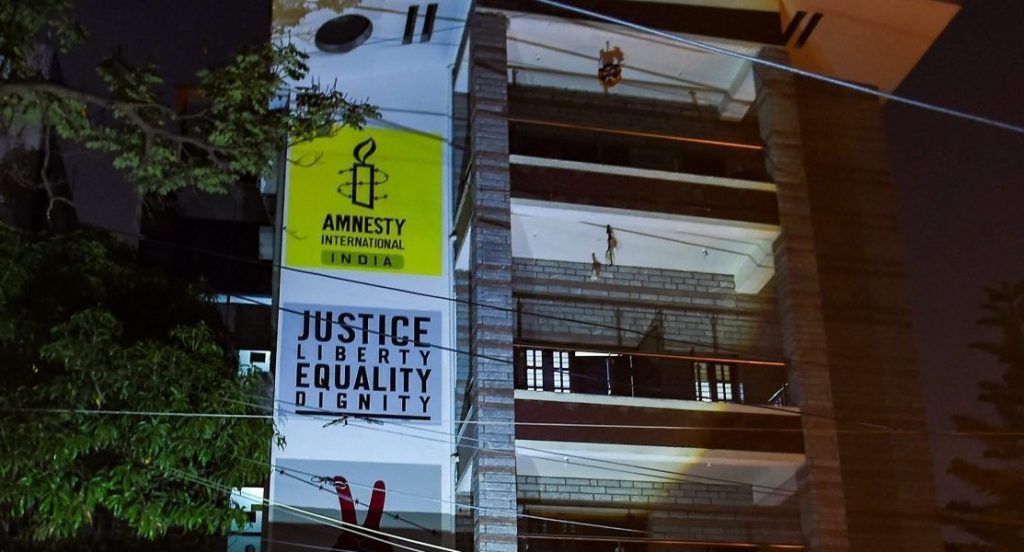Doubts are being raised about India’s commitment to human rights after the strange manner in which the Centre has frozen the funds of Amnesty International (AI) and applied curbs on its functioning in this country. A peeved AI has stopped its activities for now. Considering the good work it has been doing in India as also globally for long years, the present offensive against it by the Modi government looks harsh and definitely beyond its normal call of duty. AI has been taking up human rights causes such as ending torture, minority rights, ending death penalty and refugee issues worldwide.
Amnesty International is a 1977 Nobel Prize-winning global entity doing yeoman services to uphold human rights and freedom of individuals for the past over sixty years. A non-governmental organisation performing the role of the world’s principal watchdog, it has nearly a crore of followers or members across the spectrum of the global educated elite. Though it has its base in London and an obvious western orientation to its styles of campaigns, AI has a reputation for being non-partisan, and its voice is heard with respect by most governments. Admittedly, it has always been a thorn on the side of every government, democratic or authoritarian, that has its mistakes pointed out, especially hi the field of human rights. Although no government claims to be fond of Amnesty yet almost all democratic governments have accepted to coexist with it. By chasing Al away, the Indian government joins the club of countries like Russia and a few others that do not have any merit to their claim of being democratic.
Amnesty International is functioning in India for long, and one of our columnists, Aakar Patel, headed its India operations in recent years. Patel himself had been booked a while ago by the Bengaluru police after he commented on social media in support of the African American George Floyd, who was suffocated to death by the police in the US in May this year. The Al India chief’s call was for the disadvantaged sections in India too to march to the streets in the face of such indignities. The action on him was perhaps only the start of a dreadfully dark period in the history of this country.
What seems to have apparently antagonized the Indian government was the professional and objective manner in which this global rights organization did its field studies and commented on the human rights violations in Jammu and Kashmir, especially in the aftermath of the abrogation of the special status for the region since August 2019. Kashmir is thoroughly a police state, backed by the might of the Union government which has kept several political and social leaders under house arrest since August 2019. They have no recourse to legal relief either as the Supreme Court is unwilling to hear the multiple petitions filed with it. There is a censorship on news dissemination from the Kashmir valley, and the world got wind of what happened in this troubled region through agencies like the Amnesty International. While that, in many ways, builds the credibility of a democratically functioning system, the Indian government seems totally intolerant to criticism of any kind. It somehow seems to miss the point that throwing organizations like Al may temporarily halt criticism but the overall damage to India’s image internationally will be much worse. Any inconvenient finding or report by such an entity can always be contradicted by the government. That rebuttal would always seem more honest if criticism is permitted.
The government may or may not have more reasons to turn against Amnesty but this much is obvious that an international agency like AI cannot act or function according to the diktats of a government or local establishment if it has to retain its international acceptability. If it does so, or suppresses information that it has access to, its credibility is at stake. AI is such a large organisation with such a clout that it cannot afford to remain quiet about what it observes as wrong actions of a government. Such had been the case in the past too, but successive governments in Delhi had always given sufficient elbowroom to organizations like AI to function within the general limitations imposed on any foreign entity to work from this country. The government now probably feels that AI, by its actions, has trespassed into the political realm— meaning its observations have put the government on the defensive in the Kashmir issue in front of the international fora.
Internationally the impression is gaining ground that the Modi government is keen on suppressing information and only wants selective leaks that would favour its actions, be it about Kashmir or other respects. The Indian media has become, more or less, a captive entity across the spectrum, more so the visual media and the government is rarely taken to task for its actions. Interestingly, most of the prominent tv channels are seen vehemently questioning the Opposition while the anchors scream and shout on behalf of the government. With international watch dog organizations chucked out, national media cowed down or purchased and the opposition baton charged by police wherever they go, the Modi govt seems to be heading the Ostrich way. If that desert bird hid its face and is unable to see the impending danger, it comfortably numbs itself thinking the danger too will not see it. Sadly, the modern world does no longer (Unction in such archaic style. Transparency is the only way forward. The whole world is not besotted with any individual of this country as many Indians seem to believe. This nation will outlive every individual and every political party. The citizen will suffer if the image of the country is belittled globally.
